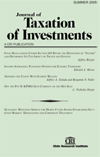A Question Important to Investors (Whether They Realize It or Not): Is Realization a Constitutional Requirement for Income Taxation?
Author: Erik M. Jensen .
Source: Volume 31, Number 01, Fall 2013 , pp.19-33(15)

< previous article |next article > |return to table of contents
Abstract:
This article considers whether realization continues to be a constitutionalrequirement for an accession to wealth to be included in the base of the federal income tax. Most commentators had thought that the Supreme Court’s 1920 decision in Eisner v. Macomber, which treated realization as central to the meaning of “taxes on incomes” in the Sixteenth Amendment, was deadwood, or close to it. In 2012, however, in his controlling opinion in National Federation of Independent Business v. Sebelius , Chief Justice Roberts cited Macomber favorably on a point critical to the resolution of that case. If realization still has constitutional legs, a number of provisions in the Internal Revenue Code, including those that rely on mark-to-market concepts, are constitutionally suspect.Keywords: realization, apportionment, direct taxes, taxes on incomes, Sixteenth Amendment, Eisner v. Macomber, Pollock v. Farmers’ Loan & Trust Co., National Federation of Independent Business v. Sebelius, mark-to-market
Affiliations:
1: Case Western Reserve University School of Law.